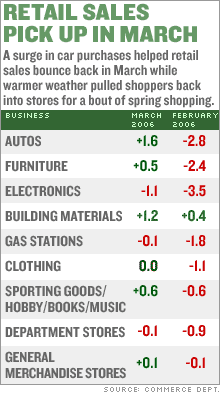|
Retail sales rebound in March
Strong auto sales helped spur overall results last month; sales excluding autos weaker than expected.
NEW YORK (CNNMoney.com) - Retail sales rebounded moderately in March from a poor showing in the previous month, helped mostly by a pick-up in automobile purchases, the government said Thursday. The Census Bureau report reported a 0.6 percent in retail sales last month, compared with a revised 0.8 percent drop in February. Total sales in February were initially reported to have dropped 1.4 percent.
Economists surveyed by Briefing.com had forecast a 0.5 percent gain for the month. Excluding volatile auto sales, sales rose just 0.4 percent in March versus a revised 0.3 percent drop in February. But the number fell shy of economists forecast for a 0.5 percent gain. Sales, ex-auto, were originally reported to have fallen 0.6 percent. According to the report, car sales jumped 1.6 percent in March, rebounding from a 2.8 percent drop in February. Among the other strong performing categories, furniture and home furnishing stores logged a 0.5 percent gain in the month, sales of building materials jumped 1.2 percent and sales at sporting good, music and book stores increased 0.6 percent. However, a calendar shift that pushed the Easter holiday into April this year versus March last year most likely hurt clothing, accessories and gift sales. The report showed sales at apparel stores were flat for the month, while department store sales slipped 0.1 percent. But electronics stores were the hardest hit in the period, registering a 1.1 percent drop in sales. UBS economist Jim O'Sullivan said the modest March gains indicate that consumer spending "still looks pretty solid." "The revisions in February were a surprise and helped boost the first quarter average for consumer spending," he said. He now expects a 5.5 percent annualized real consumer spending growth for the first quarter compared to a 0.9 percent increase in the fourth quarter. At the same time, he added that there were reasons to think consumer spending would start to slow in the coming months particularly as rising interest rates discourage home owners from tapping into their home equity as an additional source of spending income. Others were less concerned. Anthony Chan, chief economist with JPMorgan, said optimism about the jobs market was also acting as a spending catalyst, helping to counter the pressure of rising energy prices on consumers' wallets. "It appears that the general improvement in labor market conditions, as evidenced by the recent decline in the unemployment rate, is currently offsetting the effect of rising energy prices," Chan wrote in an email to CNNMoney.com. "Additionally, it was quite impressive to learn that the effects of a late Easter failed to depress the overall headline number as much as was expected thereby providing some hope that spending will not slow as much as expected during the second calendar quarter," he said. ---------------------
Click here for more news on the economy. |
|

